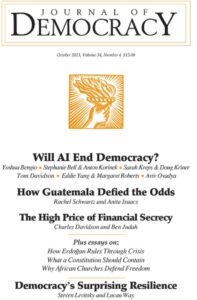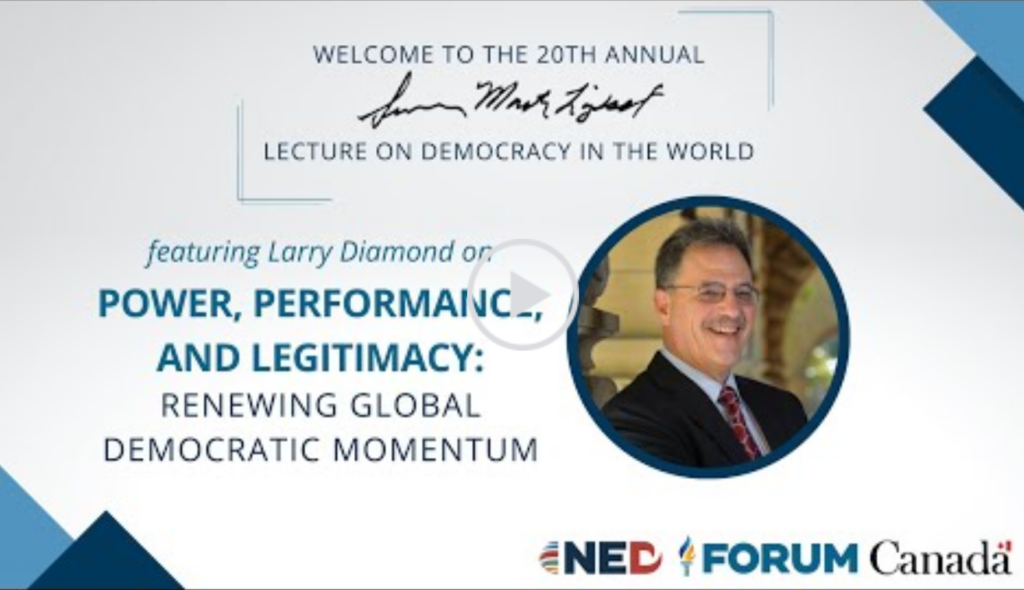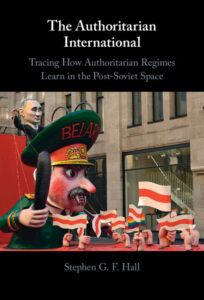Chinese leader Xi Jinping spoke of a “strengthened political mutual trust and international coordination” with Belarus after he met with the European country’s president in Beijing on Monday, according to official media, AP reports.
In the present era of globalization, major authoritarian powers have nestled themselves in the slipstream of global informational, technological, and financial flows, notes Christopher Walker, Vice President for Studies and Analysis at the National Endowment for Democracy. They have found that opportunities associated with massive secret wealth, opaque algorithms, and the pervasive surveillance that is now baked into nearly every aspect of daily life align well with their antidemocratic preferences.
 Viewed another way, the world has become flatter for authoritarian powers, he writes for the Journal of Democracy:
Viewed another way, the world has become flatter for authoritarian powers, he writes for the Journal of Democracy:
For democracies to safeguard their systems and retake the initiative, they will need to return to first principles, including those of free expression, openness, and accountability that can serve to recalibrate the asymmetries that are advantaging the autocracies. If the fight is going to be brought to the autocrats, and if the asymmetries of advantage are to be reduced, democracies will need a decidedly different scope and quality of preparation.
The Chinese Communist Party (CCP) is seeking to impart to the wider world a different information culture that serves a particular interest: it is one that spans geopolitics, economic arrangements, and – crucially – governance models, Walker asserts in written testimony to the House Select Committee on Strategic Competition between the U.S. and China.
Through well-resourced media initiatives, the autocrats in Beijing and elsewhere rarely shy away from criticizing democracies. And in narrative competition terms, “the relentless assailing of democracy and ideas that underlie it by the autocracies has undoubtedly had an impact,” in corrosive ways we still do not fully understand, he said in a presentation on “Discourse Power: The CCP’s Strategy to Shape the Global Information Space.”
Given these conditions, the U.S. and other democracies will be obliged to invest far more into information and media domains in ways that can more meaningfully compete with the already well-developed CCP-driven global authoritarian media infrastructure, Walker added. RTWT
#China seeks to impart to the wider world an autocratic information culture that spans geopolitics, economic arrangements & governance models, @ThinkDemocracy‘s @Walker_CT told the #HouseSelectCommittee on #StrategicCompetition between the U.S. & #CCP. https://t.co/2vp2B91UVz
— Democracy Digest (@demdigest) December 5, 2023
The democratic West may lose the fight for democratic values if it fails to embrace modern technology [and counter autocrats on that terrain] as a tool of foreign policies, Russian propaganda and disinformation expert Peter Pomerantsev tells Ukrinform (above).
Paul Lynch’s Booker Prize-winning novel, Prophet Song, serves as a stark reminder of the chaos and hardship that political populism and authoritarianism invariably bring, former Hong Kong Governor Chris Patten writes for Project Syndicate.
Xi and Putin have made common cause against the US, but their complex ties – rooted in self-interest – are ultimately fragile, @RadioFreeAsia‘s #LunaPham reports. https://t.co/2jLsn6UBGu
— Democracy Digest (@demdigest) December 5, 2023
Xi and Putin have made common cause against the US, but their complex ties – rooted in self-interest – are ultimately fragile, RFA’s Luna Pham reports.
Mutual economic interests aside, “shared threat perceptions” lie at the core of their bilateral relations, according to Ian Storey, a scholar at the ISEAS – Yusof Ishak Institute in Singapore, RFA’s Luna Pham reports. “Moscow and Beijing view the United States’ primacy as contrary to their national interests and a threat to regime survival.” In his opinion, the Russian and Chinese leaderships believe the U.S. is pursuing a containment strategy against them and is “determined to overthrow their authoritarian political systems by orchestrating ‘color revolutions.’”
Power, Performance, and Legitimacy
The 2023 Seymour Martin Lipset Lecture on Democracy in the World will be delivered by Larry Diamond, Mosbacher Senior Fellow of Global Democracy at the Freeman Spogli Institute for International Studies, Senior Fellow at the Hoover Institution, Stanford University, and founding Coeditor, Journal of Democracy. The lecture will be followed by a conversation with Diamond and Sviatlana Tsikhanouskaya, moderated by NED’s vice president for studies and analysis, Christopher Walker. December 06, 2023 05:00 pm – 06:45 pm. RSVP
The Authoritarian International: Learning, Adaptation, and Failure









